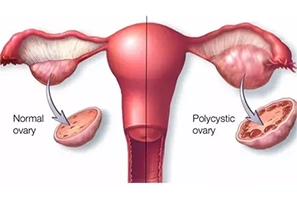Best Doctor for PCOD Treatment in Ahmedabad
Dr. Aishwarya Raj is renowned as the premier doctor for PCOD, offering unparalleled expertise and compassionate care. With a deep understanding of the condition and a patient-centric approach, She delivers the best-in-class treatment, empowering patients to lead healthy and fulfilling lives.
- 25 years of experience in PCOD treatment.
- A Complete Diet Suggestion according to sugar level
- Talk to Our Expert for free
Book Appointment
PCOD Treatment Treatment in Ahmedabad
There is no one test that can be used to identify polycystic ovarian syndrome (PCOS). Your health care practitioner will most likely begin by discussing your symptoms, medications, and any other medical issues. Your provider may also inquire about your menstrual cycle and any weight fluctuations. A physical checkup will look for evidence of excessive hair growth, insulin resistance, and acne.
The ovaries are a female's reproductive organs that control the menstrual cycle and the synthesis of hormones such as estrogen, progesterone, inhibin, relaxin, and others. The excess of eggs causes the ovary to enlarge and release high amounts of male hormone, resulting in infertility.
- Acne on the skin
- Gain in weight
- Pregnancy loss, Oligomenorrhoea, Amenorrhoea
- Hirsutism
- Voice change
Causes of PCOD :
- Androgen levels have risen. increased male sex hormones can cause a variety of physical symptoms, including increased face and body hair and male-pattern baldness.
- Periods that are irregular. Due to an anomaly in egg maturation, you may experience irregular periods or a delayed menstrual cycle.
- Difficulty conceiving owing to irregular, delayed, or failed ovulation. The body's hormone imbalance prevents the follicles from developing and releasing the egg, resulting in delayed or unsuccessful ovulation. This has a significant impact on the menstrual cycle and, as a result, your periods. Many women are diagnosed with PCOD after visiting their doctor about their inability to conceive.
- Hair loss or severe thinning of the hair. This symptom is also caused by an increase in the synthesis of male hormones in the body.
Diagnosis Test :
- Blood pressure, glucose tolerance, and cholesterol and triglyceride levels should be checked on a regular basis.
- Depression and anxiety screening
- Obstructive sleep apnea screening
Treatment
- PCOS treatment aims to address specific concerns such as infertility, hirsutism (excessive hair growth), acne, or obesity.
- Treatment approaches may involve making lifestyle changes to manage symptoms and improve overall health.
- Medication may be prescribed to help regulate hormonal imbalances and manage specific symptoms.
- Lifestyle changes may include adopting a healthy diet, regular exercise, stress management, and adequate sleep.
- Treatment plans are tailored to individual needs and may involve a combination of lifestyle modifications and medication.
- Regular monitoring and follow-up with healthcare professionals are important for effective management of PCOS symptoms.
Best Doctor For PCOD Treatment

Dr. Aishwarya Raj, the best and renowned endocrinologist at Aaryaa Endocrine Clinic, is widely regarded as the best doctor for PCOD treatment. With an impressive track record of delivering exceptional patient care, Dr. Raj has established herself as a trusted expert in the field.
With years of experience and extensive knowledge in PCOD, Dr. Raj offers comprehensive and personalized treatment plans for patients. She understands the complexities of PCOD and recognizes the importance of tailoring treatment to meet the unique needs of each individual.
Dr. Raj stays up-to-date with the latest advancements in PCOD research and treatment modalities. Her approach combines evidence-based practices with compassionate care, ensuring that patients receive the highest level of medical attention.
If you're seeking the best doctor for PCOD treatment, look no further than Dr. Raj at Aaryaa Endocrine Clinic. Visit https://aaryaaendocrine.com/ to learn more and schedule a consultation. Take the first step towards effective PCOD management and a healthier life under the care of the top specialist in the field.


